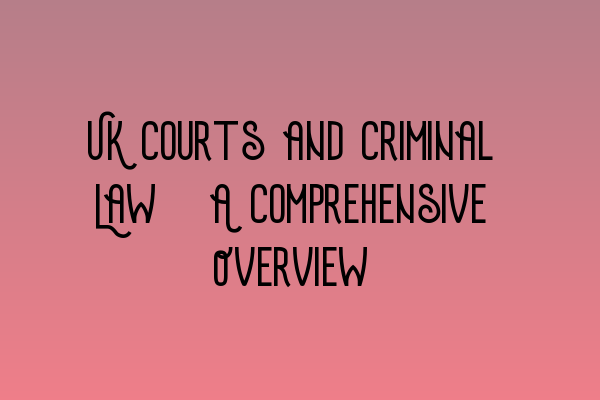UK Courts and Criminal Law: A Comprehensive Overview
Welcome to SQE Criminal Law & Practice Law UK, your reliable source of information on UK courts and criminal law. In this comprehensive overview, we will delve into the key aspects of the UK’s legal system that shape the administration of justice in criminal cases.
The UK Court System
The UK court system is divided into several hierarchical levels, each with distinct roles and responsibilities:
- The Magistrates’ Court
- The Crown Court
- The Court of Appeal (Criminal Division)
- The Supreme Court
At the Magistrates’ Court, criminal cases are initially heard. Magistrates, who are legally trained local volunteers, preside over these courts. They handle less serious offenses and play a vital role in committal proceedings for indictable offenses. Certain cases may be tried solely by magistrates, while others are sent to the Crown Court.
The Crown Court deals with more serious criminal cases, including indictable offenses. Here, cases are presided over by High Court judges or Circuit judges. The Crown Court conducts trials with a jury, which comprises members of the public who decide the guilt or innocence of the accused.
Statutory and Common Law Offenses
In the UK, criminal offenses are governed by both statutory law and common law principles. Statutory offenses are established by Acts of Parliament, while common law offenses have evolved through court decisions over time.
Statutory offenses encompass a wide range of criminal behavior, including but not limited to theft, assault, burglary, and drug-related crimes. The Sentencing Council provides guidance to judges when determining appropriate sentences for these offenses.
Common law offenses, such as murder, manslaughter, and conspiracy, have their foundations in legal precedent. The interpretation of these offenses may evolve as higher courts examine and clarify the principles involved.
Key Roles in Criminal Proceedings
Several key roles play pivotal roles in criminal proceedings:
- The Prosecution: The Crown Prosecution Service (CPS) represents the state in criminal proceedings and is responsible for presenting evidence and making legal arguments.
- The Defense: Defense solicitors and barristers represent the accused, ensuring their rights are protected and mounting a strong defense.
- The Judge: Judges oversee the trial, ensuring fairness and adhering to legal principles. They provide guidance to the jury on points of law and determine sentences upon conviction.
- The Jury: Juries are made up of ordinary citizens who are responsible for considering the evidence and reaching a verdict based on the facts presented.
The Importance of Legal Representation
Legal representation is paramount in criminal cases. Access to competent and knowledgeable solicitors and barristers ensures that individuals receive a fair trial and have their rights protected. Preparation courses for the SQE exams equip aspiring solicitors with the necessary skills and knowledge to provide effective representation to their clients.
Conclusion
Understanding the UK courts and criminal law is crucial for legal professionals and individuals navigating the criminal justice system. By being aware of the structure and roles within the court system, as well as the types of offenses and the importance of legal representation, individuals can better navigate the complexities of criminal law.
For those preparing to enter the legal profession, SQE Criminal Law & Practice Law UK offers comprehensive practice exam questions and practice mocks to enhance their knowledge and improve their performance in the SQE exams. Stay informed about SRA SQE exam dates to plan your schedule accordingly.
